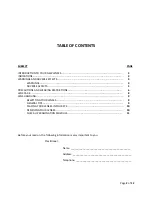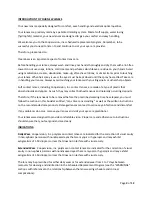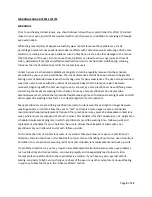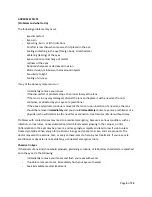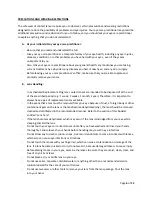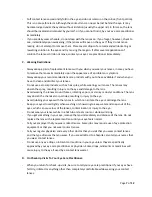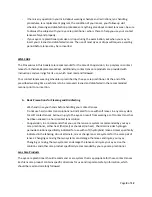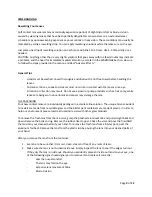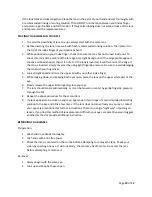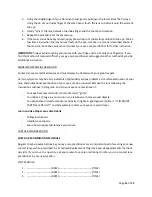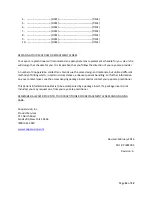
Page
7
of
12
‐
Soft
contact
lenses
occasionally
fold
in
the
eye
and
do
not
remain
on
the
cornea
(front
portion).
This
is
no
cause
for
alarm.
Although
the
contact
lens
can
never
be
lost
behind
the
eye.
It
may
become
lodged
under
the
eyelids
without
irritation
(usually
the
upper
lid).
In
this
case,
the
lens
should
be
located
and
removed
by
yourself,
or
if
you
cannot
find
it,
by
your
eye
care
practitioner
immediately.
‐
If
you
are
daily
wear
schedule,
do
not
sleep
with
the
lenses
on.
If
you
forget,
however,
check
to
see,
immediately
upon
awakening,
if
the
lenses
will
move
on
the
eyes.
If
they
do
not
move
readily,
do
not
attempt
to
remove
them.
Place
several
drops
of
a
recommended
lubricating
or
rewetting
solution
in
the
eyes
and
try
moving
them
again.
If
after
several
applications
of
solution
the
lenses
still
do
not
move,
contact
your
eye
care
practitioner
immediately.
C.
Wearing
Restrictions:
‐
Always
keep
a
pair
of
replacement
lenses
with
you
when
you
wear
your
lenses,
in
case
you
have
to
remove
the
lenses
immediately
upon
the
appearance
of
a
problem
or
symptom.
‐
Always
keep
your
recommended
lens
care
products
with
you
to
have
available
if
and
when
you
have
to
clean
and
disinfect
your
lenses.
‐
Do
not
use
aerosol
products,
such
as
hair
spray,
while
wearing
your
lenses.
The
lenses
may
absorb
the
spray,
resulting
in
injury
to
the
eye
and
damage
to
the
lens.
‐
Avoid
wearing
the
lenses
around
fumes,
irritating
vapors,
or
smoky
or
dusty
conditions.
The
lens
may
absorb
the
chemicals
or
particles,
resulting
in
injury
to
the
eye.
‐
Avoid
rubbing
your
eyes
with
the
lenses
in,
which
can
irritate
the
eye
or
dislodge
the
lens.
‐
Keep
your
eyes
closed
tightly
when
washing
or
showering
to
keep
water
and
soaps
out
of
the
eyes,
which
can
cause
loss
of
the
lenses,
contamination
or
injury
to
the
eye.
‐
Do
not
wear
your
lenses
while
in
a
hot
tub
or
steam
room
or
while
swimming.
‐
If
you
get
something
in
your
eye,
remove
the
lens
immediately
and
dispose
of
the
lens.
Do
not
replace
the
lens
with
a
replacement
lens
until
your
eye
feels
normal
‐
Tell
your
employer
that
you
wear
contact
lenses.
Some
jobs
may
require
use
of
eye
protection
equipment
or
that
you
not
wear
contact
lenses.
‐
Tell
your
regular
physician
and
every
other
doctor
that
you
visit
that
you
wear
contact
lenses
and
the
type
of
lenses
that
you
wear.
If
you
are
admitted
to
a
hospital,
also
tell
your
nurses
that
you
wear
contact
lenses.
‐
Do
not
use
any
eye
drops,
ointments
or
medicine
in
your
eye
unless
they
are
specifically
approved
by
your
eye
care
practitioner
or
physician.
Some
drops,
ointments
or
medicines
will
cause
injury
to
the
eye
if
used
by
a
contact
lens
wearer.
D.
On
Check
‐
Up
Visits
To
Your
Eye
Care
Practitioner:
‐
When
you
return
for
check
‐
up
visits,
be
sure
to
tell
your
eye
care
practitioner
if
your
eyes
have
felt
dry,
irritated
or
anything
other
than
completely
comfortable
while
wearing
your
contact
lenses.


